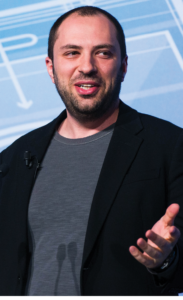
“We want to know as little about our users as possible,” Jan Koum claims. Mr Koum is cofounder of instant messaging app WhatsApp. It seems an unlikely way to run a tech company, given that so many companies make money using or selling consumers’ personal information – often so other businesses can target their advertising accordingly.
But advertising is another thing Mr Koum wants to play no part in the popular service he cofounded with Brian Acton. Born in Ukraine, Mr Koum was not subject to commercial marketing as a child and doesn’t see why anyone else should be.
His first ever tweet was a quote by the character Tyler Durden from the film Fight Club positing: “[Advertising] has us chasing cars and clothes, working jobs we hate so we can buy sh*t we don’t need.”
“[At WhatsApp], we don’t know your name or your gender,” he has said. “We’re not advertisement-driven so we don’t need personal databases.” Mr Koum also has a strong position on holding other information from users, such as messages themselves.
He links this to his childhood in the Ukraine: “Everything you did was eavesdropped on, recorded, and snitched on. When we were kids, I had friends get into trouble for telling anecdotes about communist leaders. [In America] you have democracy and freedom of speech. Our goal is to protect that. We don’t save any messages on our servers, we don’t store your chat history.”
Mr Koum emigrated to the US with his mother at 16. He taught himself about computers by buying manuals from a store and returning them once read. He barely managed to finish high school. For a time, he and his mum lived on food stamps. Mr Koum got a job at Yahoo! while at San Jose University but soon dropped out of school and spent the next nine years at the tech giant.
In 2014, WhatsApp was sold to Facebook for $19bn just four years after its launch; Mr Koum’s own share is thought to have been around $7bn. Yet even with his billions in the bank, Jan Koum says his motivation is in building great products rather than accumulating wealth.
The idea for what became WhatsApp began as a status update for phones. It soon evolved to become a messaging app, with the ethos “No ads, No games, No gimmicks.” So far, they’ve been able to stay true to that ideology.
Two years ago, as Facebook bought the company, WhatsApp had around 450 million monthly active users. Now it has surpassed the one billion mark – nearly one out of every seven people on Earth use the app regularly.
Still, Mr Koum has no plans to slow down. Remembering the difficulties he experienced as a teenager in trying to contact the friends and family he’d left behind in Ukraine, his aim is for everyone to be able to stay in touch around the world. “We won’t stop,” he says, “until every single person on the planet has an affordable and reliable way to communicate with their friends and loved ones.”






























